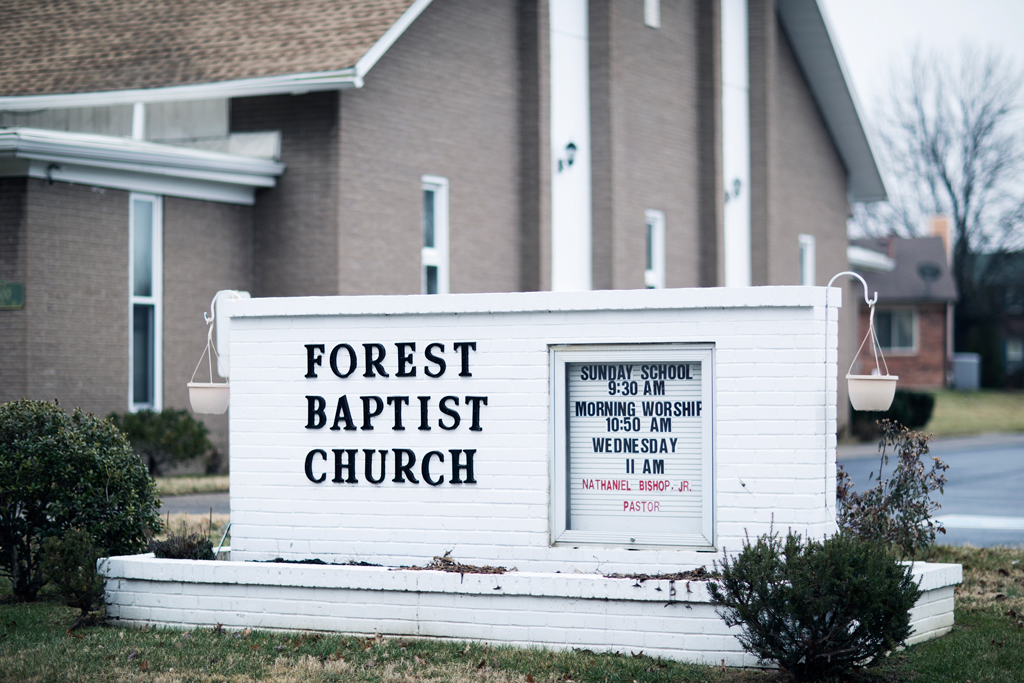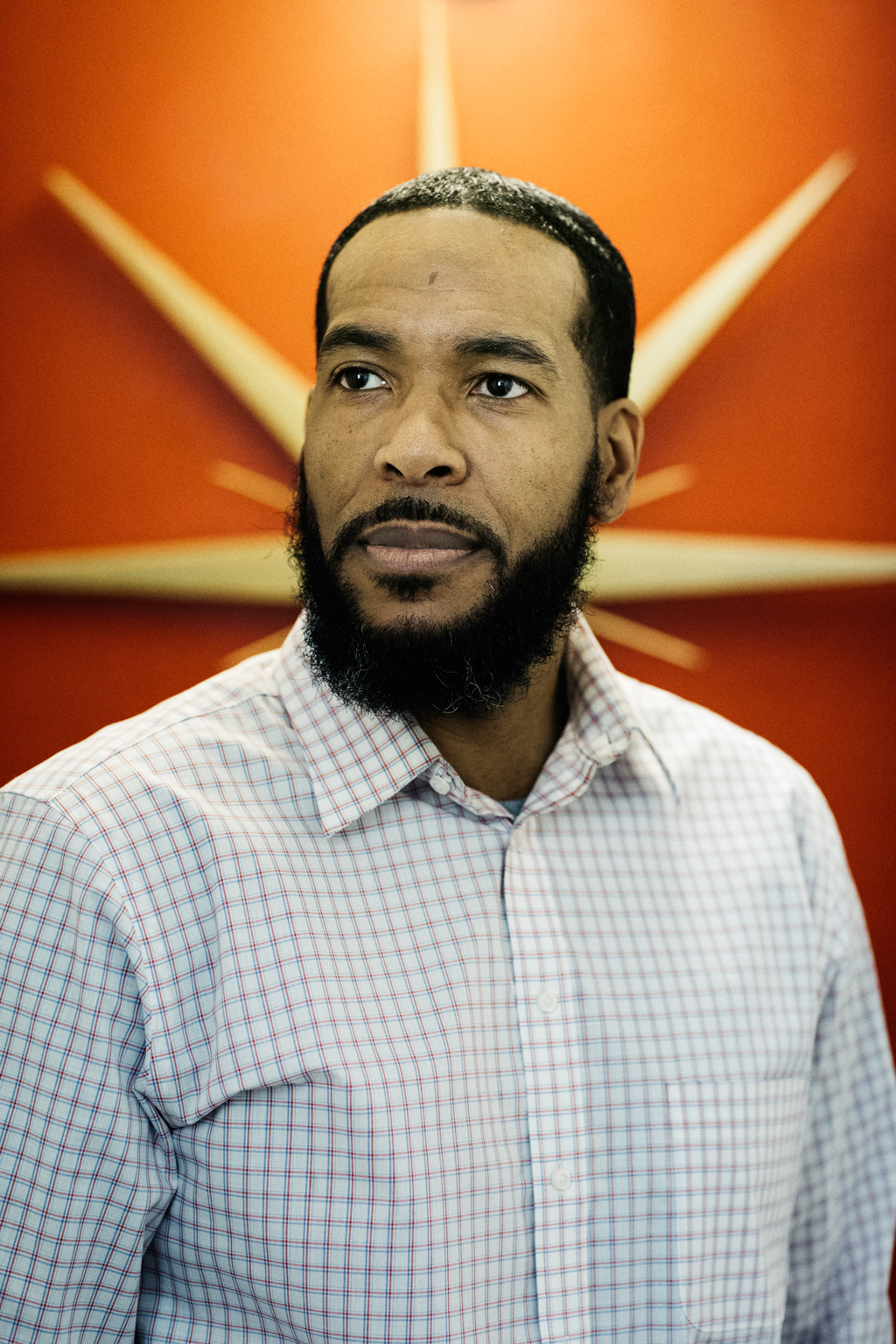Nate Bishop uprooted his family from their hometown in Michigan to attend Southern Seminary. This left them disoriented, adjusting to a new city, the rigors of theological education, and a new way of life. During his first semester, culture shock hit.
Bishop said during his first semester, “[I] felt like a fraud, and thought ‘What have I been doing?’ But the Lord used that time to crush my pride and break me to the point where I needed to be so he could build me back up.”

Surprised by Southern
Bishop sensed God’s call to ministry from a young age. He grew up in a Christian home, where he attended Middlebelt Baptist Church in Inkster, Michigan. Initially, Bishop felt drawn toward some sort of ministry, not specifically pastoral ministry. He enjoyed serving and fit comfortably in a local church setting.
Once Bishop graduated college, he worked for Ford Motor Company’s advertising agency as their associate vice president for technology, where he planned and programmed web launches and marketing projects. He also served Middlebelt part time as a youth pastor. To help him in that work, Bishop began taking free online ministry courses from a large Christian university. He said this was when he “fell in love with theological education.” But he knew he needed more than an online course or two.
In 2008, Bishop and his wife, Dar-isha, visited Southern Seminary on a whim. They were traveling through Louisville, Kentucky, on their way to a wedding, and decided to stop and visit the campus.
When they pulled onto campus, they knew this was where God wanted them.

Bishop spent the next year working at Ford and preparing to move to Louisville. Providentially, a friend from college, Jamaal Williams, was also studying at Southern Seminary and pastoring in the city. Williams, then the pastor of Forest Baptist Church, asked Bishop to serve with him as youth pastor.
Bishop’s role at Forest Baptist began in 2010, on top of seminary classes, a job on the seminary’s campus in the technology department, and a growing family.
His worlds collided in a matter of weeks. Bishop’s job at Forest allowed him to apply what he learned in classes throughout the week: teaching congregants about spiritual disciplines and how to study the Bible. His theological knowledge moved from theory to application as he ministered to people in his youth group. And as Williams worked to move Forest toward an elder-led congregation, Bishop said it provided him a good opportunity to watch and learn how to lead change in a church context.
In November 2015, Williams became the lead pastor at Sojourn Community Church’s Midtown campus. Before the transition, he told Bishop he wanted him as the pastor of Forest Baptist. Bishop said he never thought about becoming a senior pastor. Yet, he said, God “burdened” his heart for pastoral ministry. Bishop accepted an interim pastoral position at Forest, and in July of 2016 the church called him their full-time pastor.
“It’s still surreal, walking in and being able to say ‘This isn’t work. This is who I am.’ The Lord has shown me the pastorate is what he created me for, and being able to walk in that has been phenomenal. It’s hard work — the ups and downs of ministry, the difficulties and challenges that come with it — but I wouldn’t want to trade it for anything else.”
Bridging the gap
Forest Baptist Church sits across the street from one of the oldest African American cemeteries in Kentucky, which points to its rich history.
Forest Baptist Church’s inauguration was in 1864, when former slave Eliza Tivis started the church in her home. Tivis, born into slavery in Virginia around 1803, moved to Kentucky with John Hundley and Thomas Hundley, who owned the land surrounding Forest Baptist. Tivis cared for Thomas Hundley on his deathbed. And he bequeathed her a portion of his land and $2,000. Once freed, she used the land and money to help build Forest Baptist’s original church building.

Almost exactly 150 years later, Bishop serves as Forest’s 31st pastor.
He believes his time at seminary prepared him to serve Forest, including pressing pastoral issue among Black Southern Baptists like bridging cultural and racial gaps. The legacy of Forest Baptist drives Bishop in ministry, knowing he follows in the footsteps of many faithful Christians who served this church before him.
“The Lord used Southern to equip me, but also to shake me, to wake me up, and then he put me here to serve an historical African American church,” Bishop said. “He put me here to bridge cultural gaps and speak about relevant issues in addition to preaching and teaching each week.”
Denominational leadership
In late 2017, the Kentucky Baptist Convention elected Bishop as first vice president. He is the second African American to hold the position. When he received a nomination, Bishop said he felt unsure about it because it came only a year after he began his pastorate at Forest. As Bishop considered the trajectory of his life, though, he realized how God orchestrated each season perfectly with what he needed.
“I thought about how the Lord has always opened the doors — I haven’t tried to become things. The Lord opened the doors and I’ve walked through them.”
Bishop believes it is a position he can use to further the work of racial and socioeconomic reconciliation in Louisville and beyond.
“I see it as being a voice at the table to point out, bring to mind, elevate the concerns of the marginalized and oppressed — those who may not have a voice. The Lord has chosen me to be a voice, an advocate — to continue to be a liaison between cultures that I’ve always been, to be that bridge.”
From his time taking online theology courses to his technology background with Ford, the pieces of Bishop’s life all fit together for his roles today at Forest and the KBC. Each season prepared him to bridge cultural and racial gaps, becoming a voice for his congregation and now more widespread through the KBC. His ministry position at the church became more than a job and turned into a calling on his life. Today he hopes his ministry can help provide those around him the opportunity to be heard and cared for by the church.
———
RuthAnne Irvin is the associate editor for Made to Flourish, a church-resourcing ministry. She is a graduate of Boyce College.



